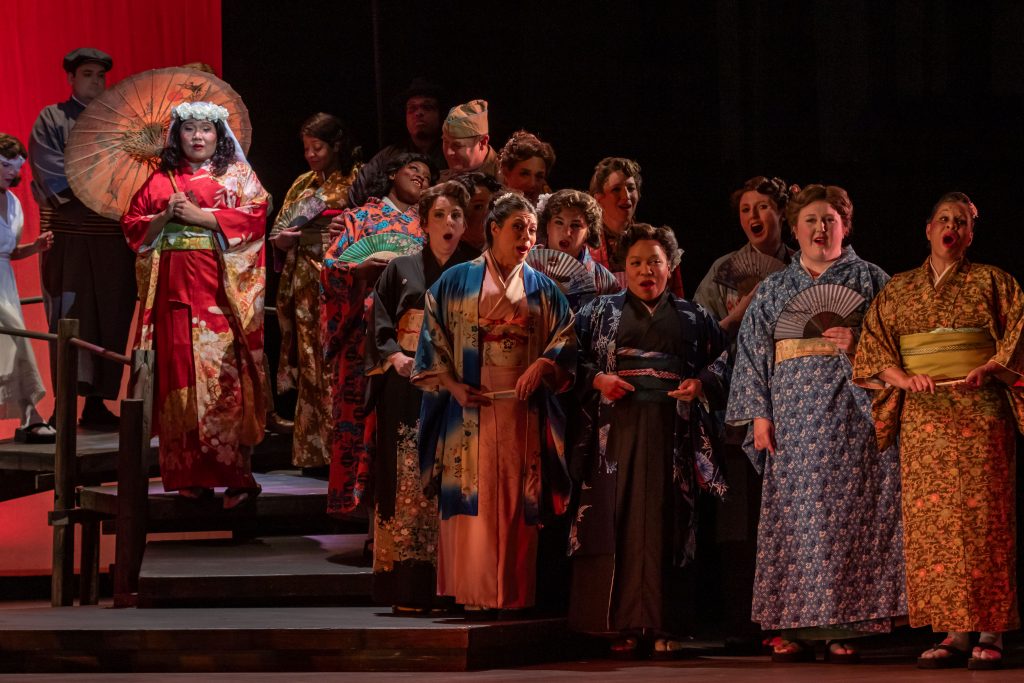Madama Butterfly Delights In Brief Run
Opera is among "best and most thoughtful" Florentine productions.
The melodic lines of Madama Butterfly are among opera’s most familiar and overdone. The racism and sexism still make us squirm over what were common European attitudes 120 years ago when Giacomo Puccini lyricized the story of a very young but faithful geisha and her Pinkerton, the self-centered unfaithful American naval officer.
So it’s all the more stunning that this is one of the best and most thoughtful productions fashioned by the Florentine Opera for Uihlein Hall of the Marcus Performing Arts Center.
The quality arises partly because of partnerships with the Virginia Opera and the Kentucky Opera. This allows regional companies to share first class principals, first class design and first class rethinking by stage director Mo Zhou and movement specialist Asuka Morinaga Derfler.
They shift the story far away from the early 1900s into post-World War II Japan, to a huge traditional house of sliding doors high above Nagasaki. It is a playground for Ruoxuan Li’s costumes, which impishly mix the 1940s era, but mainly it is a playground for arresting hues and shadows from lighting designer Marie Yokoyama. Her contributions are essential to the production’s impact. Colors and postures ripple in subtle tune with the music and the performers.
Dyan Yoder’s supertitles above the stage also deserve credit. They are used as an interim explanation about U.S. soldiers and Japanese women after World War II (this sidelight may not be a perfect match with Puccini’s original version, but it sure stirs deeper thinking). The pace of the supertitles is also a reminder of how repetitions in Italian wording were a challenge that led to rethinking opera acting gestures and interaction. While not perfectly met, these staging elements are far more sensitive to the human behavior within the story.
Puccini, after an initial failure in 1904, rewrote this opera multiple times. We might wish this was because he recognized the inherent racism and cultural stereotyping, particularly Pinkerton’s callous treatment of the geisha and also Butterfly’s shifts in loyalty toward Western culture and money. But history suggests the reworking was more out of orchestral concerns and improvements, given his flood of instruments and thematic echoes. A passage in one aria forecasts the piercing scream in another scene. His rethinking benefits us, as does the rethinking of the technical experts in this production.
Let me also indulge in a moment of hometown pride. It is for the Milwaukee Symphony Orchestra, sensitively commanded in the pit by conductor Francesco Milioto. I hazard a guess neither Virginia nor Kentucky will field such subtle expertise. The Florentine Chorus is also used more carefully, coached so that movement as well as entrances and exits fit the musical needs.
It is the lead singers who will draw the most praise, particularly Karen Chia-ling Ho as Cio-Cio-San (Butterfly). Her soaring soprano has both shattering strength and limpid clarity, singing the famous “Un bel di” to an imagined horizon at the back of the theater, or when she is heard as an offstage echo, or square center in a brilliant duet with her mezzo maid Suzuki (a part not only sung powerfully by Kristen Choi but amazingly stoic and hypnotic in needed acting moments).
Soprano Ho also matches the character’s mood swings, moving from a girlish bride to a dismissive mistress of the house to a blind believer her American will return.
The role of Pinkerton (once Enrico Caruso’s claim to fame) features not just impaling tenor cries from Adam Diegel but subduing tones and bursts of ardor when needed. At first, I feared that the casting of a Korean American in this part was an attempt to diminish the Caucasian callousness of Pinkerton, but Diegel’s acting choices made me a believer because of how he mixes arrogance, desire and cowardice. And the singing! This is a case when the mixture of boos and applause at his curtain call is actually a compliment not a criticism.
Also outstanding as Sharpless, the U.S. consul who senses the tragedy unfolding, is baritone Grant Youngblood, who keeps us interested not just in the singing but as he watches, anticipates, but alas fails to change the consequences.
Even the way the director handles the child in the piece – named Sorrow in this production and Trouble in others – shows a sensitivity to the music and the realities of stage interplay. There is a freedom to let the music speak to us, to let operatic tradition merge with a more thoughtful approach to interior meanings.
Dominique Paul Noth served for decades as film and drama critic, later senior editor for features at the Milwaukee Journal. You’ll find his blog here and here.
If you think stories like this are important, become a member of Urban Milwaukee and help support real, independent journalism. Plus you get some cool added benefits.
Review
-
Eating Burmese in Bay View
 Dec 13th, 2025 by Cari Taylor-Carlson
Dec 13th, 2025 by Cari Taylor-Carlson
-
Casablanca Is a Milwaukee Success
 Nov 30th, 2025 by Cari Taylor-Carlson
Nov 30th, 2025 by Cari Taylor-Carlson
-
Oh, Those Witty 18th Century Brits
 Nov 24th, 2025 by Dominique Paul Noth
Nov 24th, 2025 by Dominique Paul Noth
Theater
-
Oh, Those Witty 18th Century Brits
 Nov 24th, 2025 by Dominique Paul Noth
Nov 24th, 2025 by Dominique Paul Noth
-
Skylight’s Holiday Show Is Lots of Fun
 Nov 16th, 2025 by Dominique Paul Noth
Nov 16th, 2025 by Dominique Paul Noth
-
Rep’s ‘Come From Away’ Is a Triumph
 Nov 10th, 2025 by Dominique Paul Noth
Nov 10th, 2025 by Dominique Paul Noth




















How I wish I could have read this review before the run was over, so I could have attended.